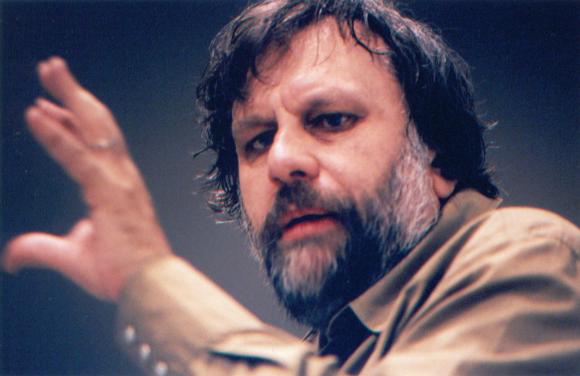PROVIDENCE, R.I. [Brown University] — Renowned Slovenian cultural theorist and philosopher Slavoj Žižek, will deliver the Roger B. Henkle Memorial Lecture, at Brown University on Tuesday, Oct. 13, 2015. His talk begins at 5:30 p.m. in Salomon Center for Teaching, De Ciccio Family Auditorium. The event is free and open to the public. Anyone wishing to attend must register for a ticket in advance at henklememoriallecture.eventbrite.com.
The lecture is presented by the Department of English, the Department of Modern Culture and Media, and the Malcolm S. Forbes Center for Culture and Media Studies. Titled “More Alienation, Please!” Žižek’s talk argues that while emancipation has long been understood as a struggle against alienation, the time has come to focus on alienation's liberating aspects: the positive role of the state against direct democracy, the use of cliches in language, the necessity of disciple versus spontaneity.
The lectureship was established in memory of Roger B. Henkle, professor of English and modern culture and media, who began teaching at Brown in 1968. For more than 20 years,until his death in 1991, Henkle led his students and his colleagues into new areas of critical inquiry, and his critical works, from Reading the Novel (1977) and Comedy and Culture: England, 1820-1900 (1980) to The Imagination of Class: Masculinity and the Victorian Urban Poor (Ohio State 2006), his final project, published posthumously, reveal the trajectory and breadth of his historical imagination and literary thought. As the founder and director of the Program in Modern Literature and Society, chair of the Department of English, and a founding member of the Center for Modern Culture and Media, he built an institutional legacy that continues to shape the work of cultural studies at Brown.
Slavoj Žižek
Slavoj Žižek is a Slovenian philosopher whose work focuses on German Idealism. He is well-known for his expansion of the Hegel-Marx dyad into the triadic configuration Hegel-Marx-Lacan and for illustrating abstruse philosophical arguments with concrete and often humorous examples from popular and high culture. In 1990, when the first free elections were held in Slovenia, Žižek ran for the presidency, which he lost by a slim margin. Around this time, he came to the attention of the English-speaking world with the publication of three books in rapid succession: The Sublime Object of Ideology (1989); Looking Awry: An Introduction to Popular Culture through Lacan (1991); and For They Know Not What They Do: Enjoyment as a Political Factor (1991).
Since then the pace of his publications has not abated. In 2013, he published what he himself referred to as his masterwork, the long-awaited Less Than Nothing: Hegel and the Shadow of Dialectical Materialism; only to follow it up the next year with another Hegel book, Absolute Recoil: Towards a New Foundation of Dialectical Materialism. Žižek is the subject of four documentaries, including Astra Taylor’s Žižek! (2005). He is also screenwriter and presenter in two films directed by Sophie Fiennes, The Pervert’s Guide to Cinema (2006) and The Pervert’s Guide to Ideology (2012). There exists a journal devoted to his work, The International Journal of Žižek Studies. In 2013, the director of London’s Royal Opera House announced that he had commissioned four new operas inspired by Žižek’s writings. The Guardian has called him the “most high-profile and controversial public philosopher of our time.” Žižek currently hold appointments at the Institute for Sociology and Philosophy at the University of Ljubljana; the Institute of Humanities at Birkbeck College, University of London; New York University; and the European Graduate School.

